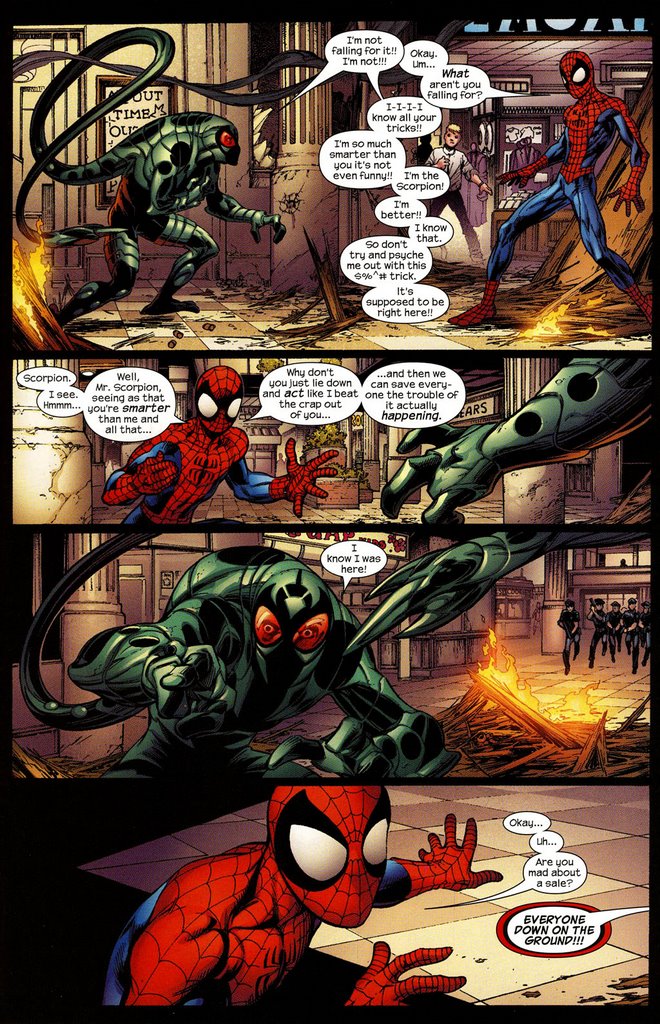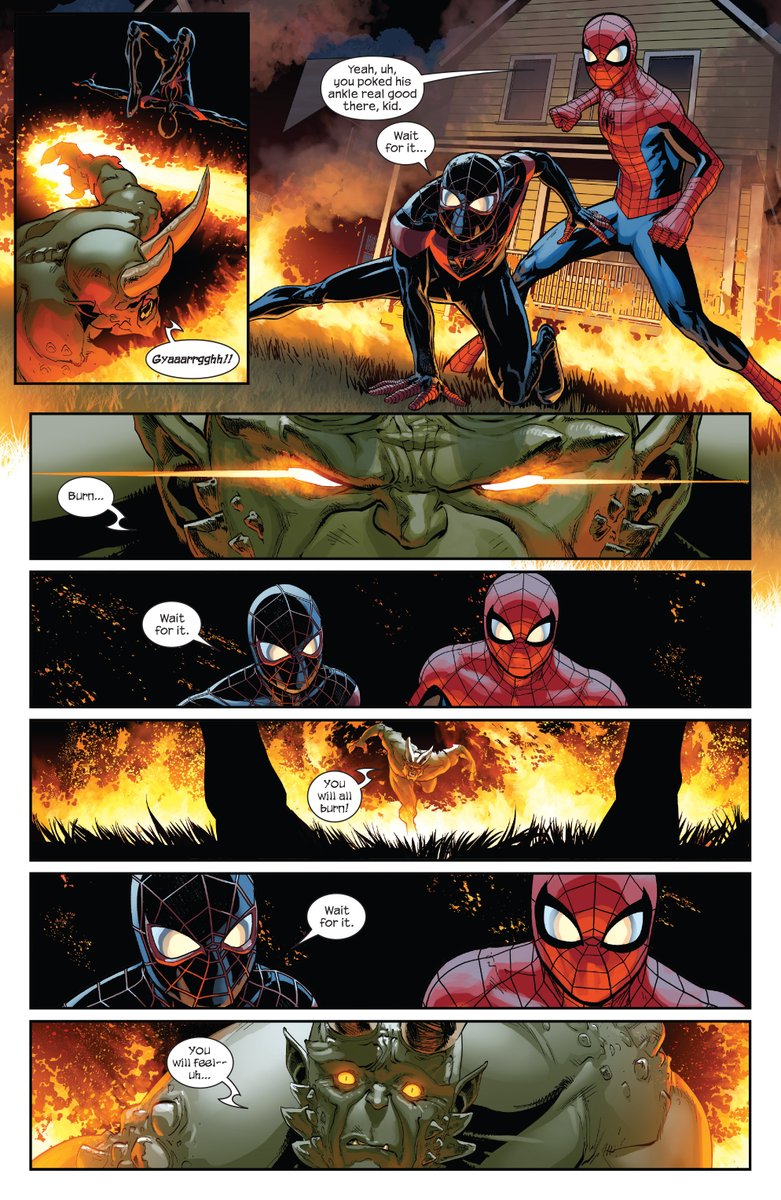I was playing a big open world video game (which I like a great deal) and thinking about how most gamers don& #39;t complete games and I think maybe, just maybe... it& #39;s because the games aren& #39;t actually that interesting.
I realize this tweet can be taken the wrong way, so hear me out.
When I write a movie or a tv show, I write in a way that ensures each scene leads to the next scene. A comic writer once pointed out that Bendis was VERY successful in part b/c every one of his pages ends with a kind of question, someone talking off panel, or a splash.
and I think, maybe when I play a big, open world video game, I stop caring about what happens next, because there& #39;s so, so, so much of it that isn& #39;t interesting or compelling.
"go to point A to kill X demon bunnies" isn& #39;t, like, something I emotionally care about.
"go to point A to kill X demon bunnies" isn& #39;t, like, something I emotionally care about.
a lot of game design focuses on theme park design (rooted in maybe-not-actually-that-accurate hypotheses!) and psychological compulsion (operant conditioning, baybee!!!) to "motivate" players...
but what if the best way to motivate them was the same way TV motivates you?
but what if the best way to motivate them was the same way TV motivates you?
many of us binge-watched the first season of Stranger Things (or any serialized tv show you love, from Breaking Bad to Carnivale), because we wanted to know what happened next.
In a game designed all around dopamine hits... maybe emotionally, players stop giving a fuck?
In a game designed all around dopamine hits... maybe emotionally, players stop giving a fuck?
I think it& #39;s attractive for people, especially engineers, to want to believe there& #39;s some Scientific Formula To Get People To Keep Playing, but I think the fact that most players don& #39;t finish games is proof that your finely tuned dopamine addiction mechanics don& #39;t actually work.
Like... I have 1500 hours in one of the most enjoyable first person shooters I& #39;ve ever played, but then they announced that the loot I tried to grind for would be essentially useless in the future. When my emotional attachment to the loot I was grinding for was gone, I stopped.
I think the reason that literally every game with a gear score system has failed miserably--with one exception--was because gear score actually fucking _sucks_ but it looks like a perfect way to psychologically condition players to stick with it on paper.
We do this thing in games where we go "this made a lot of money; clearly that is because everything it does is good," but sometimes successful games do things that aren& #39;t good; everyone who copied the gear score system has had to learn that lesson--gear score wasn& #39;t why it ruled.
People want to form emotional attachments to things and they want to know what happens next.
So if you make something that isn& #39;t interesting--that doesn& #39;t make players want to know what happens next--then... most won& #39;t stick with it.
So if you make something that isn& #39;t interesting--that doesn& #39;t make players want to know what happens next--then... most won& #39;t stick with it.
I& #39;m often excited going into a show& #39;s season or series finale.
With a game I& #39;m all too often like "thank god it& #39;s fucking over."
With a game I& #39;m all too often like "thank god it& #39;s fucking over."
If compulsion mechanics MUST be included in games, they should grease the wheel; make it go down smooth. But they aren& #39;t the CORE of the thing. The core of the thing still has to be predominantly emotional, I think.
And that scares people because... they want to believe everything has a mathematical formula, some scientific, like, on paper "design according to this and your game will succeed" nonsense. You see this in Hollywood with people who revere Story/Save the Cat.
If every game were built with the ending in mind--every scene working towards that ending--maybe people would stick around more than they would for "kill 4 sharks" or "a quest where I want something but I have to do a favor for a guy that involves doing a favor for another guy"
I think the reason I went hard on Death Stranding the way VERY few other open world games have made me do was because I genuinely, truly wanted to know what would happen next
Why does a human being, emotionally, want to get to your ending, and how can you make each quest make them want it more?
since some people have taken this thread _purely_ to mean story, please consider game design as a form of storytelling, not in plot or character, but in raw terms of "the audience has to want to get to the next scene on an emotional level; how can we achieve this?"
like, let& #39;s say I give you an assignment: create a hypothetical doom WAD (non TC) where you have no dialog or cutscenes or anything; all you have are the tools that were used to make Doom in 1993. How can you tell a story with that; how can you create desire through mechanics?
Plot is great, character is great, but from a purely game design perspective, how can you create desire in the player? Maybe you have a locked room with a shotgun in it? Now the player Wants To Get To The Shotgun.
This is how really good action scenes are written in movies btw
This is how really good action scenes are written in movies btw
anyways, I& #39;m making a little narrative game called Adios
https://store.steampowered.com/app/1271400/Adios/
and">https://store.steampowered.com/app/12714... I& #39;ve done NDA& #39;d work on a bunch of stuff. I was also fortunate enough to work on Hardspace: Shipbreaker!
If you need a writer or a story consultant, hit me up.
https://store.steampowered.com/app/1271400/Adios/
and">https://store.steampowered.com/app/12714... I& #39;ve done NDA& #39;d work on a bunch of stuff. I was also fortunate enough to work on Hardspace: Shipbreaker!
If you need a writer or a story consultant, hit me up.
I guess a way of putting this is: game and narrative design are actually operating in the same space. The purpose of narrative design is not to communicate information, but to help ground your game& #39;s _emotional context_. You can still ground your game emotionally in _other ways_
An example of this is a game where you get backed up against the wall by enemy forces, but then a tank busts through a wall and someone gives it to you and then the enemies start doing their fear state animations and you feel powerful. You& #39;ve created an emotional turn.
a lot of people have replied to me in the context of "open world games." Let me be clear: The Last of Us 2 has the exact same problem. It& #39;s trying to follow McKee& #39;s template and doing a bad job and it hopes the excellent performances are enough to pull the player along. It isn& #39;t.
Because Lou2 spends a lot of time repeating the emotional beats for Abby that we saw with Ellie, the strength of those moments is lost. So a lot of people going "the game& #39;s too long" are actually telling you that they& #39;re emotionally bored with the experience.
LOU2 might be a pretty good but flawed game if it was JUST Abby& #39;s plot; by trying to tell a story of two characters one after the other where the emotional beats are copies of each other, it loses momentum.

 Read on Twitter
Read on Twitter



